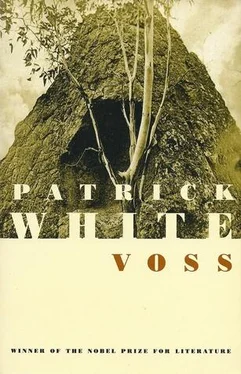‘I do not imagine I shall be able to satisfy your curiosity,’ Miss Trevelyan answered at once, clasping her hands together as they walked away. ‘I had heard that you wished to question me. It would give me great pleasure. But —’
They were marching rather than walking, and regimented words filled her mouth.
‘I do not want to open old wounds, nor intrude upon your private feelings,’ the equally stilted Colonel pursued.
Although wooden, he continued, nevertheless, to walk firmly towards a little summer-house that he had spied out beforehand, behind some tea trees. The schoolmistress, through necessity, was trying to match his gait, almost like a man. She was rather dark, but pleasant.
‘I am grateful for your concern in the matter,’ she was saying. ‘But I assure you your delicacy is misplaced. Mr Voss was an acquaintance of a few days, indeed, no more than a few hours, if one stops to consider.’
‘Quite,’ said the Colonel, putting his hand in the small of her back to guide her into the summer-house. ‘It is natural, Miss Trevelyan, to form impressions even in a few hours. But, if you are unwilling to share those impressions, who am I to force you?’
They continued to stand, although there were some benches and a small, rustic table. The furniture moved grittily as the man and woman jostled it.
‘But I know so very little,’ Miss Trevelyan protested.
If that little is not everything, the Colonel felt.
They were sitting down. They were putting their hands in front of them on the table.
‘And besides,’ she said, ‘if my memories are partly of an unpleasant nature, I do not care to tell them of somebody who is, or, rather, who could be, dead. I do know, however, that Mr Voss had some very undesirable, even horrible qualities.’
‘That is of the greatest interest,’ said the Colonel.
‘Otherwise,’ she said, ‘I do not believe that he would have been a man.’
If it had been Mrs de Courcy who had spoken, the Colonel would have understood that this was the point at which to make a joke.
But the schoolmistress was moistening her lips.
‘Such horrible qualities,’ she added, ‘one wonders whether one has not interpreted them according to what one knows of oneself. Oh, I do not mean what one knows . What one suspects!’
She was very agitated. Although still a young woman, and beautiful, she had aged, he realized, and recently. Her dark eyes were filling the little summer-house. They were brimming and swimming.
‘Do you consider the unfortunate qualities of which you speak might have grated on the men under his command and weakened his hold as a leader?’
She was looking about her. Now she was caught. The little summer-house was most skilfully constructed, of closely plaited twigs. It had a deserted smell.
She could not answer him, nor look, not even at his bony hands. The silence was stretching. Then, when it had almost broken, she shuddered, and cried out:
‘You would cut my head off, if letting my blood run would do you any good.’
‘It is not for my sake. It is for Mr Voss.’
‘Mr Voss is already history.’
‘But history is not acceptable until it is sifted for the truth. Sometimes this can never be reached.’
She was hanging her head. She was horribly twisted.
‘No, never,’ she agreed. ‘It is all lies. While there are men, there will always be lies. I do not know the truth about myself, unless I sometimes dream it.’
‘Shall I tell you what I know?’ asked the Colonel keenly. ‘About Voss? Or are you not sufficiently interested in the fate of a mere acquaintance?’
‘For all your kindness, you are the cruellest,’ she said, looking at the table.
‘On my travels I spent several nights at Jildra Station, the property on the Darling Downs from which the expedition started out. Mr Boyle, the owner, was helpful, but unreliable, owing to his inordinate liking for rum. Two blackfellows from Jildra accompanied Voss to the west. One, an old man, returned soon after setting out. The second reached the station, how long afterwards I am unable to calculate owing to Boyle’s vagueness, but certainly a considerable time. The old man, Dugald, talked to this boy, who seemed to be in a state of perpetual mental distress, even unhinged, in Boyle’s opinion. Boyle questioned Dugald, who professed to have learnt from the lad that a mutiny had taken place. Then the boy — Jackie, I think his name was….’
‘Jackie,’ said Laura Trevelyan.
The Colonel frowned at his audience for the interruption, and continued.
‘Jackie wandered away from Jildra. He returns on and off, but his movements and behaviour are incalculable. I would have questioned Dugald personally, but was informed that the old native had died a few weeks before my arrival at the station.’
Colonel Hebden, who was accustomed to tearful women, had become conscious of a dry, burning misery. He did not look at Miss Trevelyan, however.
‘Another fact of interest. Some time after the apparent disappearance of the expedition, a tribe of aboriginals, driven eastward by drought, put in at Jildra, were entertained by the station natives, and fed by the owner. On one occasion, it appears, the visitors held a corroboree, in the course of which they enacted a massacre of horses. Again, Boyle, who was almost continually in his cups, could not provide me with satisfying details.’
In the silence the two people listened to the pricking of the tea-tree walls.
‘What of Jackie?’ Laura Trevelyan said.
She did not ask. She was too heavy. Her intonation was one of statement, rather.
‘You know,’ said the Colonel, ‘that is where I have failed. I will go back. You have convinced me, Miss Trevelyan, that I should. Thank you.’
‘Oh, no,’ she begged. ‘Do not go back. They are dead. It is over. Let them be. We suffered enough, all of us.’
‘Of all those men, some could have survived. Jackie did. And we must not forget the mutineers. However blameworthy their behaviour, we cannot abandon them, poor devils.’
Miss Trevelyan bit her mouth.
‘Voss could have been the Devil,’ she seemed to remember, ‘if at the same time he had not resembled a most unfortunate human being.’
How unfortunate, the Colonel saw, now that the pride of this young woman had crumbled into a distorted pity. For a man, he was extraordinarily interested in women. He had always been interested rather than in love, except in the case of his wife, and there his love was, perhaps, more a mingling of ‘appeased convention and affectionate respect.
But he could not continue to look at the schoolmistress, waiting for her to resume her shell, nor would words of comfort have been other than clumsy, so he simply said:
‘I am sorry. Perhaps you would rather I left you.’
She refused his offer, however, saying:
‘One must resist the impulse to hide in corners.’
Then she got up, smoothing her rather suitable dress of plain grey.
As they walked between the trees towards the guests, she continued to tremble, and Mrs de Courcy, who had been expecting them, came forward looking anxious.
‘Is there anything I can do for you?’ she asked of Miss Trevelyan, in accents that expressed sympathy, while her face was searching for some clue.
‘No, thank you,’ Laura replied, but gratefully.
Nobody could be ungrateful to anyone as beautiful and condescending as Mrs de Courcy.
There was soon no reason to remain at the party. The luxurious tea-tables had begun to look derelict, and little Mary Hebden, running hot and sticky amongst the guests, had become, regrettably, a nuisance.
At one old gentleman, who had been entertaining her by knotting his handkerchief into a variety of clever shapes, she shouted at last:
Читать дальше












